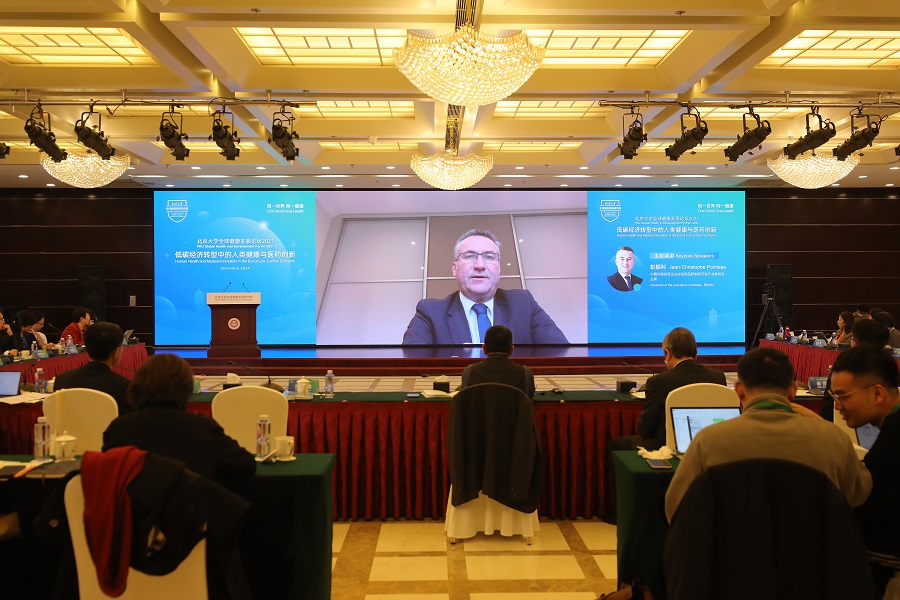
On December 22, 2021, on the first anniversary of the establishment of the Peking University Institute for Global Health and Development (PKU-iGHD), the “2021 Peking University Global Health and Development Forum: Human Health and Medical Innovation in the Era of Low Carbon Economy”was successfully held. Mr. Jean-Christophe Pointeau, Chairman of the Pharmaceutical Research and Development Industry Committee of China Association of Enterprises with Foreign Investment (RDPAC) and President of Pfizer Pharmaceutical Group China, delivered a keynote speech at the Session of Medical Innovation for Sustainable Development.
It is a great pleasure to join you today at the Peking University Global Health and Development Forum and share the stage with such distinguished speakers from across the health ecosystem here in China.
Over the past 20 years, RDPAC and its members have been privileged to witness firsthand China's remarkable economic and social transformation. This transformation has been underpinned by the Chinese government, substantial investment in the health and well-being of its people.
In the past decade alone, the Chinese government has doubled its investment in health. We have seen significant improvement across the board in public health, healthcare services, medical security, and access to medicines. Most recently, this effort has been guided by the Healthy China 2030 blueprint, which places health at the heart of policy making. The impact of its investment and the government's commitment to health and well-being has been staggering.
At the turn of the century, less than one of three Chinese people had access to health insurance. Today, China has achieved near universal health coverage, life expectancy at 77.4 years. And now very similar to that of developed nations. Infant mortality rates have plummeted, and survival rates for malignant tumor have risen by 10% points compared to a decade ago.
I'm particularly proud of the whole innovative drugs and new therapies having a place in supporting this remarkable achievements. Of course, our world changes, so do the health needs of our populations. China’s health system, like many others in the world, is under increasing pressure for an expanding middle-class, aging population, shifting burden of disease and of course, a global pandemic.
This means that if we are to achieve the goal of Healthy China 2030 vision, we all need to step up and dig deeper. Everyone has a role to play, including RDPAC and its member. In fact, research estimates that innovation in the pharmaceutical industry could help reduce China diseases burden by up to 55% by 2040. Yes, you heard me correctly, 55%.
I'd like to walk you through how RDPAC and its member plan to make this estimate a reality. Let me start with prevention. Prevention is a core component of the Healthy China 2030 vision. And one of that, the innovative pharmaceutical industry is committed to supporting. In today's world, I cannot think of a more important innovation in disease prevention than the industry's efforts to deliver COVID-19 vaccine in record time. RDPAC and its member are also committed to collaborating broadly to support over disease prevention efforts.
We do this by promoting health literacy, continuing medical education, encouraging early screening and creating management solution for chronic disease across China. RDPAC and its members are also committed to bringing new innovative medicines to China, to help patients live longer and help your lives. Although the past five years alone, multinationals introduce over 150 new innovative drugs to China, many of which targeted on unmet need in the oncology space.
Of course, we know that accelerating medical innovation to address unmet need will only get us so far. We must be able to get our innovative medicines and vaccines to patient that need them. That is why RDPAC strongly supports China’s recent efforts to expand access to healthcare, including to innovative medicines and vaccines. Let me give you free example of government reform that had really started to make a difference in this area.
First, NMPA[ZHT1] has worked hard to accelerate the drug review and approval process, and align its regulatory framework with international standards. Because of its reforms, for example, Chinese breast cancer patients were able to access Pfizer first-in-class therapy Ibrance two years earlier than originally planned.
Second, the Chinese government is also supporting efforts to improve affordability and reduce burden for patients. Last year, for example, the government announced the production of a more dynamic R&D listing system, and confirmed its intention to support the development and uptake of commercial health insurance.
Third, the Chinese government has made several important commitments to transferring the IP system, including introducing patent term adjustment on the patent link system. But there is still more to do, developing innovative medicine and vaccine is a complex multiyear and resource intensive process. It can take 10 plus years and billions of dollars to take an ID from bench to bedside with many failures along the way. For pharmaceutical companies, to deepen their investment in innovation in China, they need to know that their investment will be rewarded.
That's why an environment that values and incentivizes innovation is key to support access to medicines and medical products year after years. Integral elements of this ecosystem include a transparent and predictable pricing and reimbursement system that supports access and innovation, a regulatory system that reports global simultaneous and a strong and stable intellectual property system that is aligned with international best practice.
We look forward to continuing to collaborate with the government to support this and other health reforms. And I'm confident that by working together, we can help China realize the Healthy China 2030 visions. Thank you again for the invitation to speak today.